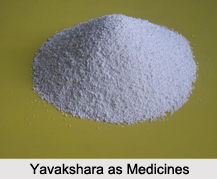 Yavakshara is mentioned by Sushruta, and has been used in medicine from a very remote period. Chemically it is carbonate of potash with some impurities.
Yavakshara is mentioned by Sushruta, and has been used in medicine from a very remote period. Chemically it is carbonate of potash with some impurities.
Preparation of Yavakshara
Yavakshara is prepared by reducing to ashes the green spikes of the barley, dissolving the ashes in water, straining the solution through thick cloth, and evaporating it over the fire. The resulting salt is a clear amorphous powder with a saline and partly acid taste.
Benefits of Yavakshara
Yavakshara is described as stomachic, laxative and diuretic. It is used in urinary diseases, dyspepsia, enlarged spleen and other enlargements of the abdominal viscera.
Dose of Yavakshara in Medicine
Yavakshara enters into the composition of numerous saline medicines. A decoction of chebulic myrobalan and rohitaka bark is given with the addition of carbonate of potash and long pepper in enlarged spleen and liver, and in tumours in the abdomen called gulma. In strangury or painful micturition, carbonate of potash with sugar is considered a very efficacious remedy. It enters into the composition of numerous saline medicines.
This article is a stub. You can enrich by adding more information to it. Send your Write Up to content@indianetzone.com




















